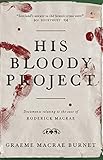This is my review of His Bloody Project by Graeme Macrae Burnet.
In 1869, Scottish Highlands crofter’s son Roderick Macrae freely confesses to the murder of three members of a neighbouring family, including “Lachlan Broad” who has bullied his father and driven him further into poverty. What could be unbearably bleak proves to be an absorbing and intriguing literary thriller, a form of “whydunnit.
We are given a number of differing viewpoint: the statements by residents of the remote coastal hamlet of Culdie; the lengthy and surprisingly articulate written account of Roderick Macrae himself, making it clear why his schoolteacher was so keen to for him to continue his studies; medical reports with an extract from “Travels in the Border-Lands of Lunacy, by an “acknowledged authority in the then nascent discipline of Criminal Anthropology”, chilling in its unconscious disdain for the “lower classes”; the drama of the courtroom trial and final epilogue on its aftermath.
All this provides a vivid impression of the harsh life in the remotely beautiful setting “with its magnificent vista of the isles of Raasay and Skye”. To an outsider, the houses of Culdie could be mistaken for “byres or pig-sties”, their rough thatch reeking with peat smoke, giving them the appearance of “gently smouldering”. We see the rigid class divide between the landowners and the crofters, with middle men like Lachlan Broad used to extract rents and dues, no questions asked as to methods. So, Lachlan can arbitrarily insist that Roderick and his father return to the water the seaweed they have spent a laborious morning cutting from the rocks to fertiliser their meagre plot.
With its relentless chain of cause and effect, this tale raises interesting questions of how matters might have turned out differently. What if Roderick’s father had possessed the flexibility and imagination to let him travel to Glasgow to be educated? What if Roderick’s two uncles had not been killed in a fishing accident years ago, thus reducing the family’s earning power? Is Roderick mad, bad, or a victim of circumstance? Should he have been judged sane or insane at the time, the latter being his only means of escaping the gallows, for a living fate which could well prove worse? How would we judge him now, with our supposedly more enlightened understanding of human psychology?
The focus on Roderick contrasts with the sketchy development of his sister Jetta’s personality and her parallel fate. Perhaps this is intentional, showing the casual sexism of their society.
My sole minor criticism is that virtually all the characters seem to communicate in a similar style with an unlikely degree of fluency. Yet I agree that the author was wise not to attempt to write dialogues in a Scottish dialect, which would have been distracting. A useful glossary is provided for the small number of local words e.g. “flaughter” meaning spade, but would have been better placed clearly at the beginning.
This well-written, skilfully constructed, subtle and thought-provoking novel deserves its shortlisting for the 2016 Man Booker Prize.
5 Stars
